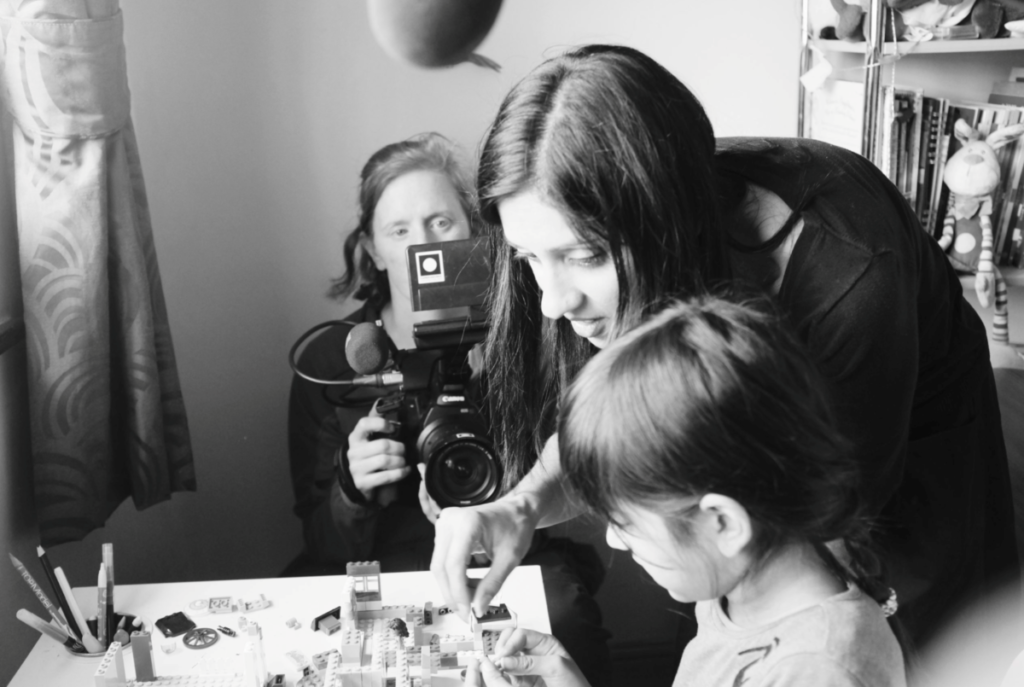September 23, 2024
In 2020, parent and carer advocacy organisation Raising Films conducted a survey. Their Back from the Brink report, dispensed after a 3-month industry hiatus, and aimed at parents and carers working in the screen sector, was revealing to say the least. Concluding that the pandemic was having an ‘overwhelmingly negative’ impact on caring arrangements, the data (perhaps unsurprisingly) pointed to women, who remain the primary caregivers, being the most affected. But things have improved, right? Well, four years on things aren’t exactly faring any better. In the wake of 2023’s US Guild Strikes, BECTU’s recently published research into the ongoing production slowdown – another setback for sector workers – points to a worrying reality. 41% of those with parenting and caring responsibilities plan to leave the industry within the next five years, compared to 36% without. Coincidentally, the exact same figures correspond to the ratio of women (41%) and men (36%) who plan on leaving the sector. In tandem, the report also shed light on existing inequalities within ethnic minority groups. According to this research, approximately 42% of Global Majority respondents, parents and carers included, don’t see a future in the sector at all.
For working parents, who have always been vulnerable to the industry’s unpredictability and often exclusionary practices, recent events have merely exacerbated the problem. Whether we’re talking pre, mid, or post-pandemic, childcare remains a critical barrier for mums, dads, parents and carers, who have no option but to endure the working parent challenges. Among them: unregulated work hours (hello 11-day fortnight), last minute job hires, lack of flexibility, location shoots and, of course, the colossal cost of childcare. Given the majority of our production workforce are freelancers, for whom accessing conventional work-place benefits like maternity leave and return-to-work provisions can be difficult, it’s no wonder many feel forced into making a choice: kids or a career.
So, what’s being done to combat it? Well, as the rapid-response to the pandemic proved, our industry can be quick to adopt and adapt to new and progressive work-place policies. And with more and more momentum driving positive change across the sector, it stands to reason further adjustments are needed for parents and carers. When asking the leading organisations working in this space what those adjustments look like, the unanimity is inspiring.

When speaking to Hope Dickson Leach, Filmmaker and Co-Founder of Raising Films, newly joined members of The Filming in England Partnership, its apparent that a top-down structural shift across the sector is needed:
“When we founded Raising Films nine years ago to campaign for and support parents and carers in the UK screen industries, we hoped by this point we would no longer be necessary. Alas, we are still here fighting for change, but we are happy to report that there have been significant improvements in that time. Conversations are happening between productions, crew and talent around how to support caregivers, job-sharing is more widely accepted, the eleven-day fortnight seems to be on the way out, childcare is even included in some budgets as an access cost – but there are still accommodations that would make life far easier that haven’t yet been adopted. The most effective of those would be nation-wide structural changes that support parents and carers in all industries: for example, childcare as a tax-deductible expense for freelancers, or widely available spaces at state supported nurseries from a year old; in addition, nurseries open 24 hours a day as they are in some European countries.”
Dedicated to increasing awareness of the barriers for parents and carers working, or wanting to work, in film and television, Raising Films have produced various resources to support employers and productions accommodate the needs of working parents and carers. Their recommended checklist for employers, individuals and companies alike second the need for tailored flexibility. Crucially, they advocate for more open family-friendly policies including job-sharing and breast-feeding/expressing spaces for women returning to work post-maternity leave. For Raising Films, it’s about creating and sustaining a culture where parenting and caregiving needs are recognised. Says Hope: “We know that change is possible, and we are so glad to have other organisations join us in fighting for the same goal.”
Another such organisation is The WonderWorks – a full-time educational facility based at the Warner Bros. Studios in Leavesden, and another member of the Filming in England Partnership. “We’ve had feedback from younger members of crew that seeing the childcare department on their Unit List feels like the futureproofing of their career” says Charlotte Riley, Actor, Mother and Co-founder. Charlotte, a long-time campaigner to ‘keep families in film’, created The WonderWorks back in 2020 after experiencing and witnessing first-hand the unique challenges of balancing work on a film set with the responsibilities of childcare. Speaking of The WonderWorks success, Charlotte notes that offering film & TV workers flexible childcare is an essential component in not only achieving full inclusivity, but in retaining workers:
“We know that families, but particularly women are now staying in the industry whilst they navigate early-parenthood because they feel supported at work. We’ve seen families choosing to have more children because the provision of childcare and support exists. There are families using the nursery with two parents that are both working on productions (previously a very rare occurrence) allowing them to earn a double income. There is a clear improvement in the wellbeing of families with the offering of a setting that is close in proximity and children who are safe, happy and enjoying the highest standards of early-years education. We also hear regularly now from individuals that tell us they wish WonderWorks had existed earlier in their careers when they had children or even that it would have meant they could have started a family.”

For The WonderWorks, it’s a simple principle. Happy parents make for happy and fulfilled workers. In offering high quality and affordable, flexible childcare, The WonderWorks give parents invaluable piece of mind. In short, they enable creative professionals to sustain their careers, removing the horrendous choice parents, and (very often) women, have been forced to make – the choice between parenthood or a career in the industry. The team understand that providing flexible childcare is a crucial step in retaining industry talent.
The success of The WonderWorks’ model speaks to the growing visibility of parents and carers and suggests a greater need to shout about good employment practice across the sector. We need to champion the companies advocating change and ensure workers recognise a company’s commitment to family-friendly policies. Alongside their checklist, the Raising Films Ribbon is awarded to productions that actively support and champion parents and carers. Recently, it was presented to Leeds-based production company Duck Soup Films. Specifically, the Ribbon was in honour of Duck Soup’s excellent example of good practice during production of their BBC One drama Lost Boys & Fairies. The production team actively encouraged job-sharing and amended their scheduling to accommodate for crew family commitments. Kate Larking, Head of Production at Duck Soup, told us:
“The industry has improved greatly as a working environment for parents and carers over the last few years. Production companies are more open to trying to be flexible with hours and job sharing where possible, and rightly so. This is something that we advocate strongly at Duck Soup Films. Our industry is tough, the hours are long and the pressure can be relentless. Several of us have experienced this first hand, whilst bringing up small children and looking after aging relatives, and we want to support work/life balance for both our employees and on our productions as much as we possibly can. At Duck Soup we do our best to avoid working weekends and bank holidays and encourage job sharing/flexible working for parents and carers wherever possible.”

It’s great to hear productions are becoming more family-friendly, but we recognise a big step towards achieving full inclusivity lies in parents’ access to job opportunities. Our industry is known for its informal hiring practices – crew calls stay within closed networks, and there’s often far too quick a turnaround from hearing about to starting a job. These last-minute recruitment tactics can act as a major barrier to parents and carers, especially after a prolonged time away from the industry. When it comes to sharing job opportunities, at Filming in England we want to ensure workers from all skills and backgrounds have equal access. Our National Crew Directory aims to find crew job opportunities via our job posting and bespoke crewing service. From new entrants to seasoned pros, our mission is to connect crew to productions based on skill level, location, and availability, giving plenty of notice, targeting the most relevant candidates. We want to make sure parents and carers aren’t excluded from opportunities.
In tandem, Filming in England have recently taken steps to promote childcare facilities to feature film and high-end TV productions. Running alongside our Crew Directory is our National Suppliers Directory – an essential resource for industry that lists and promotes regional based facilities and businesses. Earlier this year, we expanded our categories to include ‘childcare’ and are delighted to announce the first agency to join was national provider, Nipperbout. “The unpredictability of filming schedules and locations can make it nearly impossible to rely on traditional childcare services”, says Janthea Brigden, Nipperbout’s CEO. As a former actor and fulltime parent, Janthea’s early experiences mirror those of Charlotte from The WonderWorks. Janthea experienced first-hand the impossibility to flex her childcare arrangements whilst balancing work on set: “While having one parent stay at home is an option, it’s not always feasible—especially when both parents work in the industry, as my husband and I did.” For Janthea and husband Steve, Nipperbout was the solution. Now caring for over 10,000 children a year, the agency provides mobile creche facilities for film production companies, allowing, as Janthea says, for actors and crew members to fully focus on their work, knowing their children are nearby and well cared for. Sustaining careers and fostering a more inclusive, family-friendly working environment is at the heart of Nipperbout. “We take pride in employing young actors for the entertainment aspect of our services, providing them with valuable opportunities to stay in work between jobs.”

Given the current landscape, securing jobs and improving workforce inclusivity is essential. With UK production spending expected to surge by 2025 and forecasts predicting we will need approximately 15 – 20,000 additional workers [ScreenSkills, 2022], it’s more important than ever to ensure family-friendly provisions are in place. And after speaking to the leading organisations championing parents and carers rights, it’s now more obvious what those solutions are. The actions below, which are by no means the only steps available, offer a snapshot of good practises that could be standardised:
- Wherever possible, itemise childcare within production budgets.
- Ensure there are safe spaces on set for breastfeeding/expressing.
- Introduce a HR department to help counter discriminatory practices.
- Flexible working including stronger advocation for job-sharing.
- Formalise recruitment pathways, ensuring wider networks are included within crew calls.
As previously mentioned, our industry has a way of brilliantly adapting to new ways of working and given the much welcome shift in strengthening diversity and inclusivity, we need to ensure parents and workers aren’t left out of the conversation. It’s clear positive change is happening, and not just within the sector. For instance, the Spring budget revealed that from April 2024, working parents of two-year-olds would be able to access 15 hours of free childcare, and from this month (September 2024), it will extend to all children from the age of nine months. By September 2025, working parents of children under five will be entitled to 30 hours of free childcare per week. Within the sector, accessible training and development programmes remain in place for all skill levels. Though BECTU’s stats would suggest that training, though a marvellous means in skilling up the workforce, isn’t necessarily enough to propel workers to stay in the industry. If their forecasts prove true, and 41% parents and carers plan to leave due to a lack of structural and financial support, then an industry-wide policy of flexible working must be adopted. Like the WonderWorks say – “you can’t talk equality without talking about childcare.”
To find out more about Raising Films visit here
To find out more about The WonderWorks visit here
To find out more about Duck Soup Films visit here
To find out more about Nipperbout visit here
To find out more about Filming in England Crewing Service visit here and for all other enquiries please visit: https://www.filminginengland.co.uk/
To read more about parents and carers rights in the workplace, visit here



